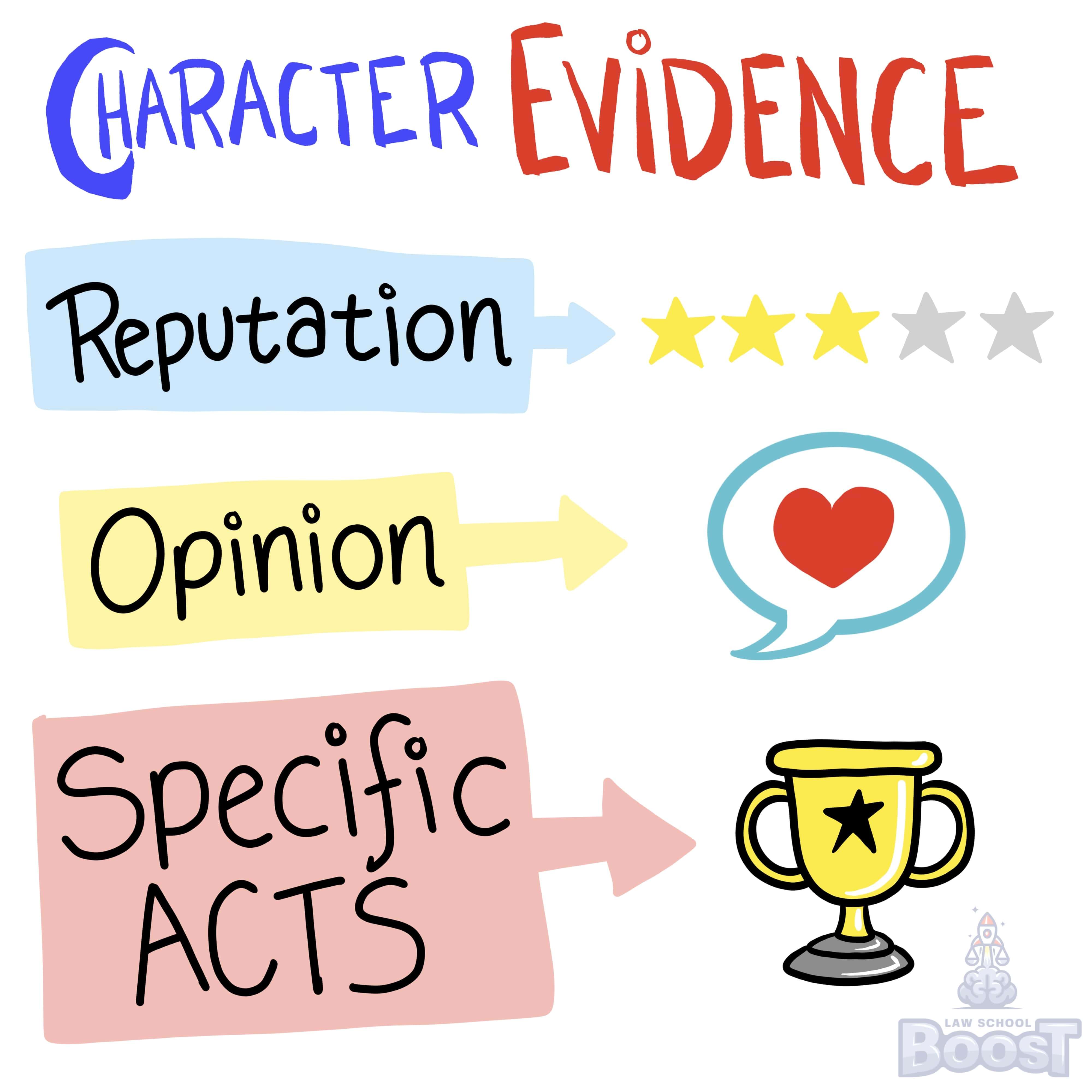🦅
Federal Evidence • Character Evidence
EVID#068
Legal Definition
Character evidence is only admissible in civil cases where the character trait itself is in issue (e.g., reputation in a defamation case). In cases involving sexual assault or child molestation, evidence of prior such acts is admissible.
Plain English Explanation
In general, civil cases should focus on the specific issues at hand rather than judging someone's overall character or past actions. But there are some exceptions:
(1) If a person's character is a key part of the case, like in defamation (where reputation is important) or in cases of negligent entrustment, character evidence can be used.
(2) Character evidence can also be used for specific purposes, like showing motive, intent, or identity, but not to prove that someone acted in line with their character.
When allowed, character evidence is generally limited to reputation or opinion, not specific actions (unless it's on cross-examination). Unlike in criminal cases, civil cases do not have exceptions for serious misconduct, like sexual assault or child molestation.
(1) If a person's character is a key part of the case, like in defamation (where reputation is important) or in cases of negligent entrustment, character evidence can be used.
(2) Character evidence can also be used for specific purposes, like showing motive, intent, or identity, but not to prove that someone acted in line with their character.
When allowed, character evidence is generally limited to reputation or opinion, not specific actions (unless it's on cross-examination). Unlike in criminal cases, civil cases do not have exceptions for serious misconduct, like sexual assault or child molestation.
Hypothetical
Hypo 1: Bob spreads rumors that Sam cheats on business deals. Sam sues Bob for defamation, seeking damages for harm to his business reputation. Result: Here, a core issue is whether Sam's reputation for honesty in business deals has been harmed. Thus, evidence relating to Sam's reputation would be admissible as the character trait itself is central to the case.
Hypo 2: Bob sexually assaults Amy. Amy sues Bob for damages. At trial, Amy wants to present evidence that Bob sexually assaulted another woman last year. Result: Since this case involves an allegation of sexual assault, evidence of Bob's alleged prior sexual assault would likely be deemed admissible. The rule allows such evidence in sexual assault cases as it helps establish Bob's propensity for such misconduct.
Hypo 3: Sam slips and falls in Bob's grocery store, fracturing his hip. Sam sues Bob for negligence relating to failing to clean up a spill. At trial, Bob tries entering evidence of one of Sam's former extramarital affairs. Result: Here Sam is suing for physical injuries sustained in Bob's store. Evidence regarding Sam's character/past personal relationships has no relevance to Bob's potential negligence or liability regarding the store conditions. Thus, this character evidence would not be admitted.
Hypo 4: Sam publicly accuses Bob of being a terrible father who never spends time with his kids. Bob sues Sam for defamation. At trial, Bob presents 50 witnesses who will testify that Bob is an extremely involved, doting father. Result: As a defamation case directly related to Bob's reputation/character as a father, this witness testimony would be admissible as evidence because the character trait at issue (Bob's parenting/how much time he spends with kids) is central to the legal dispute.
Hypo 2: Bob sexually assaults Amy. Amy sues Bob for damages. At trial, Amy wants to present evidence that Bob sexually assaulted another woman last year. Result: Since this case involves an allegation of sexual assault, evidence of Bob's alleged prior sexual assault would likely be deemed admissible. The rule allows such evidence in sexual assault cases as it helps establish Bob's propensity for such misconduct.
Hypo 3: Sam slips and falls in Bob's grocery store, fracturing his hip. Sam sues Bob for negligence relating to failing to clean up a spill. At trial, Bob tries entering evidence of one of Sam's former extramarital affairs. Result: Here Sam is suing for physical injuries sustained in Bob's store. Evidence regarding Sam's character/past personal relationships has no relevance to Bob's potential negligence or liability regarding the store conditions. Thus, this character evidence would not be admitted.
Hypo 4: Sam publicly accuses Bob of being a terrible father who never spends time with his kids. Bob sues Sam for defamation. At trial, Bob presents 50 witnesses who will testify that Bob is an extremely involved, doting father. Result: As a defamation case directly related to Bob's reputation/character as a father, this witness testimony would be admissible as evidence because the character trait at issue (Bob's parenting/how much time he spends with kids) is central to the legal dispute.
Visual Aids

Related Concepts
How do California's rules differ from the Federal rules when it comes to introducing character evidence in a case involving sexual assault or child molestation?
How is the process of offering character evidence generally handled in California?
How is the process of offering character evidence generally handled under the Federal rules?
If the defendant offers evidence of a victim's bad character, what can the prosecution offer to rebut?
In California, if the defendant offers evidence of a victim's violent character, what can the prosecution offer to rebut?
In California, when can prior acts of domestic violence or elder abuse be admissible?
In cases involving sexual assault, when may a defendant introduce specific act evidence?
What are habit and custom evidence?
What is character evidence?
When assessing character evidence, what are non-character purposes?
When is character evidence admissible in criminal cases?
When is character evidence admissible in homicide cases involving self defense? What kinds are admissible?
When is evidence of prior sexual assault or child molestation admissible?


